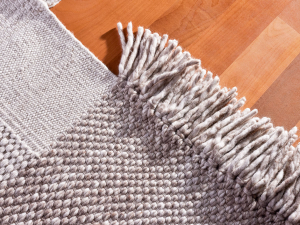Bremworth reintroduces solution-dyed nylon while backing wool carpets
Carpet maker Bremworth is reinstating solution-dyed nylon (SDN) into its product mix but says wool carpets remain central to its brand.
 The development of fully compostable carpet that can be mass-produced in a financially viable way would be transformational for New Zealand’s wool exports, says Bremworth chief executive Greg Smith.
The development of fully compostable carpet that can be mass-produced in a financially viable way would be transformational for New Zealand’s wool exports, says Bremworth chief executive Greg Smith.
The development of a prototype rug which contains no plastic materials could bring New Zealand’s wool export industry closer to mass production of fully compostable carpets.
According to data from the Ministry for the Environment, textiles, including carpet, make up approximately 5% of New Zealand landfill volumes with over 186,000 tonnes entering the waste stream each year.
Greg Smith, Bremworth chief executive, says the development of fully compostable carpet that can be mass-produced in a financially viable way would be transformational for New Zealand’s wool exports.
He says the three-year research initiative was launched as a response to consumer demand for an environmentally sound, end-of-life solution for carpet.
“We know there has been a post-pandemic shift in the way our international customers are seeing New Zealand wool, with a growing number looking to integrate natural fibre products into their home environment.
“While design and quality remain key drivers for most segments, what happens at the end of a product’s useful life is becoming an increasingly important factor in the purchase decision.”
He says that ultimately, for New Zealand wool products to carry a price premium in key export markets, the sector needs to invest in the creation of added-value products.
“Our latest research initiative is designed to help us build a product range which can be meaningfully reused or naturally returned to the earth in a way that resonates with our customer base - without compromising the design and performance that they care about,” he says.
Dr Kristine Hulse, sustainability lead at Bremworth, says while wool is a natural fibre which can break down due to its organic composition, most wool carpets use a polypropylene backing and latext which contain synthetic materials – preventing the product from being composted.
She says the new rug, which is hand woven from natural materials including sheep wool and alpaca fibres, was created as part of a rapid prototyping research initiative – designed to test a number of sustainability concepts in textile design.
Each step in the programme is designed to address barriers preventing carpet from completely breaking down at the end of its life.
“By preserving the natural integrity of the fibre we can increase the number of opportunities for product circularity, increase the number of secondary uses for used carpet and significantly reduce volumes of textiles entering the landfill,” she says.
Hulse says crossbred sheep and alpaca fibres were used in the first prototyping process to provide a broader range of colours but more trials are underway to find alternatives to the use of alpaca yarn – which is in limited supply in New Zealand.
Legal controls on the movement of fruits and vegetables are now in place in Auckland’s Mt Roskill suburb, says Biosecurity New Zealand Commissioner North Mike Inglis.
Arable growers worried that some weeds in their crops may have developed herbicide resistance can now get the suspected plants tested for free.
Fruit growers and exporters are worried following the discovery of a male Queensland fruit fly in Auckland this week.
Dairy prices have jumped in the overnight Global Dairy Trade (GDT) auction, breaking a five-month negative streak.
Alliance Group chief executive Willie Wiese is leaving the company after three years in the role.
A booklet produced in 2025 by the Rotoiti 15 trust, Department of Conservation and Scion – now part of the Bioeconomy Science Institute – aims to help people identify insect pests and diseases.

OPINION: The release of the Natural Environment Bill and Planning Bill to replace the Resource Management Act is a red-letter day…
OPINION: Federated Farmers has launched a new campaign, swapping ‘The Twelve Days of Christmas’ for ‘The Twelve Pests of Christmas’ to…